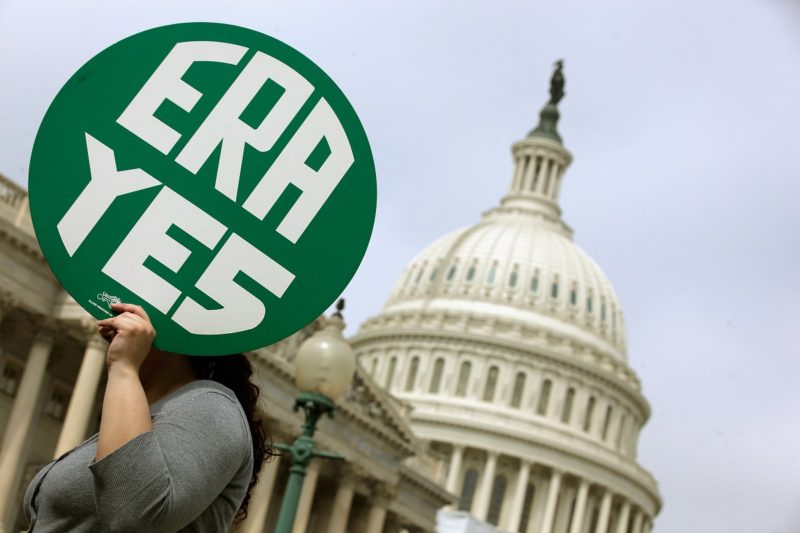Legislative Lowlights: Anti-Choice Democrats Work to Wreak Havoc on Reproductive Rights
And a Republican in Illinois is attempting to pass a resolution favored by anti-choice groups directing Congress to change the federal Equal Rights Amendment, which Illinois lawmakers just ratified.

Rewire.News tracks anti-choice and anti-LGBTQ legislation as it works its way through the states. Here’s an overview of bills we’re watching.
A Rhode Island committee considered several anti-choice bills, Illinois legislators voted to ratify the Equal Rights Amendment (ERA) despite dissent from some Republican lawmakers, and Louisiana’s Democratic governor signed a 15-week abortion ban.
Rhode Island
On Thursday, the state Senate Judiciary Committee held a hearing to consider the Reproductive Healthcare Act, which would safeguard abortion rights in the state and repeal certain state laws regulating abortion.
But anti-choice lawmakers in the state considered several bills that would restrict reproductive rights. Three pieces of legislation, sponsored by state Sens. Frank Ciccone (D-Providence) and Frank Lombardi (D-Cranston), would create or increase penalties for physicians who fail to provide proper medical care to a viable fetus or an infant born alive. S 2152, the Born-Alive Infant Protection Act, would require a physician performing an abortion to take all “medically appropriate and reasonable steps” to preserve the life and health of an infant who is born alive.
Similarly, S 2142 would criminalize the knowing and intentional failure of a physician, nurse, or other licensed medical professional to provide reasonable medical care and treatment to an infant born alive. S 2137 takes it a step further and would make it unprofessional conduct for a physician not to take all reasonable steps to ensure that a viable fetus being carried by their patient is brought to term. The “born-alive” legislation is a fear-mongering tactic favored by anti-choice groups and lawmakers based on the myth that abortion providers deliberately kill newborns delivered alive during an abortion. Despite lack of evidence to support this claim, a federal “Born-Alive Infant Protection Act” was enacted in 2002.
Ciccone and Lombardi joined state Sen. Louis DiPalma (D-Middletown) to sponsor S 2709, which would revise definitions and penalties for partial-birth abortions. In addition to being charged with a felony, a physician who performs a partial-birth abortion may lose their license and face thousands of dollars worth of fines. Partial-birth abortion bans are a scare tactic created to convince lawmakers to ban certain types of abortion procedures. The term was coined in the 1990s by abortion rights opponents lobbying members of the U.S. Congress to ban the intact dilation and extraction abortion procedure. The “Partial-Birth Abortion Ban” was signed into law by President George W. Bush in 2003.
The final two anti-choice bills discussed at the hearing prohibited dilation and evacuation (D and E) abortions and transporting a minor across state lines in order to obtain an abortion. S 2585 would ban so-called dismemberment abortions (D and E abortions) which is the most common method of performing second-trimester abortions. The anti-abortion strategy behind “dismemberment abortion” follows the same playbook of “partial-abortion” bans. Neither are actual medical terms and both are meant to evoke an emotional reaction over the rule of law. S 2791 would make the practice of aiding a minor in the process of getting an abortion a civil and criminal offense. Anyone who knowingly transports a minor across a state line in order to obtain abortion services without the consent or consents required by law would be guilty of a felony and, upon conviction, be subject to imprisonment for up to five years, and/or a fine of up to $5,000.
After hearing testimony for several hours, the committee adjourned without taking action on any of the bills.
Illinois
On Wednesday, Illinois became the 37th state to ratify the federal Equal Rights Amendment. The ERA guarantees equal rights for all citizens regardless of sex. That same day, Illinois state Rep. Sara Jimenez (R-Leland Grove) introduced HJR 138, a resolution urging Congress to adopt a modified ERA to include “common-sense abortion-neutral” language. The modified ERA would include the following clause: “Nothing in this Article shall be construed to grant, secure, or deny any right relating to abortion or the funding thereof.”
Since 1983, anti-choice group National Right to Life Committee has insisted on the need for adoption of an “abortion-neutral amendment” to any federal ERA. In fact, in April the group sent a memo to the Illinois House of Representatives, opposing the ratification of the ERA in its current form. While HJR 138 is unlikely to pass, 45 state House members voted against ratifying the ERA, so anything’s possible.
Louisiana
This Wednesday, it was announced that Louisiana Gov. John Bel Edwards (D) had signed SB 181, banning abortion at 15 weeks’ gestation. Louisiana is the second state, after Mississippi, to enact a 15-week abortion ban. Mississippi’s law was immediately challenged and temporarily blocked in federal court. The ban in Louisiana will only be enforceable if Mississippi’s law is upheld. Besides Iowa’s recently passed and clearly unconstitutional law banning abortion as early as six weeks’ gestation, the laws in Louisiana and Mississippi are the two most restrictive abortion bans in the country.
Looking Ahead …
Kentucky’s D and E abortion ban has been further delayed by a federal judge. In April, a federal court temporarily blocked HB 454, which would ban D and E abortion procedures after 11 weeks’ gestation. A federal judge this week ordered that the law will remain unenforced and the challenge to it will proceed to trial, which is scheduled for November.

